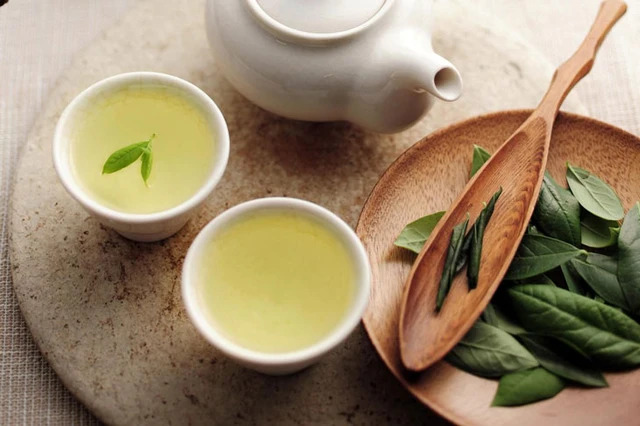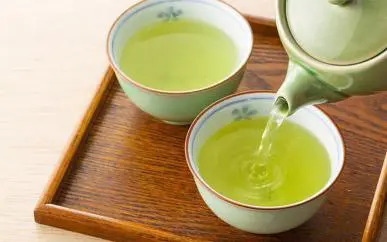10 Green Tea Benefits

Green tea, a source of antioxidants and caffeine, has several possible benefits. Research has found that the health benefits of green tea may include alleviating anxiety and stress, enhancing memory, and reducing high blood pressure and cholesterol.
1. Alleviates Anxiety and Stress
Tea contains an amino acid called L-theanine, which alleviates anxiety and stress, helping you relax. Green tea has one of the highest concentrations of L-theanine compared to black, oolong, and white tea.

Research has found that supplementing 200–400 milligrams of L-theanine daily helps reduce anxiety and stress. A study published in 2019 found that people who took 200 milligrams a day of L-theanine for four weeks had greater improvements in anxiety, depression, and sleep than those who took a placebo.
Of note: The amount of L-theanine used in the study is much more than that in a cup of green tea, which ranges from eight to 30 milligrams. Talk to a healthcare provider or pharmacist before starting supplements containing this amount of L-theanine.
2. Helps Protect Against Cognitive Decline
Some evidence suggests that drinking green tea helps protect against certain neurodegenerative diseases, like Alzheimer's and Parkinson's. Green tea has a high concentration of antioxidants, which may protect against cell damage that raises the risk of chronic illnesses.
MedlinePlus. Antioxidants.
Cognitive decline is one of the first noticeable symptoms of Alzheimer's disease and related forms of dementia. Cognitive decline involves frequent, worsening instances of confusion and memory loss.
3. Helps Support Bone Health
Green tea may lower your risk of osteoporosis, a bone disease that increases the risk of hip, spine, and wrist fractures. Postmenopausal people have the highest risk of osteoporosis. Some evidence suggests that the high concentration of antioxidants in green tea may enhance bone formation and protection against bone mass loss.
4. Improves Longevity
Drinking green tea may help support living a healthy, long life. Green tea is a source of polyphenols, or plant compounds that act as antioxidants.13
Research has found that polyphenols have anti-aging effects, such as:
- Decreasing inflammation
- Minimizing oxidative stress, or cell damage caused by harmful substances that may increase the risk of disease
- Reducing signs of aging
5. Lowers Cholesterol
A review published in 2020 found that consuming green tea helps lower LDL ("bad") and total cholesterol.3 Nearly two in five adults in the United States have high cholesterol levels, which raises the risk of heart attack and stroke.
10 Easy Food Swaps for a Tasty Low-Cholesterol Diet
6. May Enhance Memory
Research has found that the L-theanine content in green tea may improve memory. A study published in 2014 found that green tea extract improved working memory among 12 healthy volunteers.2
Working memory is a type of short-term memory necessary for cognitive functions like:
- Comprehension
- Planning
- Problem-solving
- Reasoning
In the 2014 study, researchers gave the volunteers a milk-based drink that contained either 27.5 milligrams of green tea extract or a placebo. The volunteers then completed certain tasks while an MRI tracked their brain activity.
Those who consumed the green tea extract had improved working memory, brain connectivity—how well different areas of the brain work together—and task performance. The study used a small sample of patients, so the results are not definitive. More research is needed to understand how green tea impacts memory.
7. May Manage and Prevent Type 2 Diabetes
Green tea may manage and prevent type 2 diabetes. Some evidence suggests that the antioxidants in green tea may reduce insulin resistance.

Insulin resistance causes your cells to be less receptive to insulin than usual. Insulin is a hormone that helps your cells convert sugar into energy. Insulin resistance is a major risk factor for type 2 diabetes.
8. Might Lower Stroke Risk
Stroke is one of the leading causes of death and disability among adults in the United States.19 Research has found that drinking green tea may be one way to help prevent your risk of stroke.

A study published in 2023 found that consuming moderate amounts of green tea, or about 17–34 ounces, daily may reduce your stroke risk by at least 21%. It's unclear why green tea lowers stroke risk. Some experts suspect that the lifestyle habits of green tea drinkers, such as eating a balanced diet, may influence stroke risk.
9. Might Support Weight Loss
Some evidence suggests that green tea may help you lose weight. Green tea is a source of catechins, an antioxidant that helps break down fat. Catechins may increase your metabolic rate, which helps you burn more calories, such as while exercising.
Most available research has only looked at green tea extract rather than steeped tea. Even so, green tea extract may have minimal effects on weight loss. Experts advise eating a balanced diet and regularly exercising to help you lose weight. Excess weight may increase your risk of chronic illnesses like heart disease and type 2 diabete
10. Reduces Blood Pressure
Green tea may protect heart health by lowering blood pressure. Research has found that drinking green tea reduces blood pressure significantly, particularly in people with a high risk of heart disease.
High blood pressure is one of the leading causes of heart disease and stroke because it damages the lining of the arteries, which increases the risk of plaque buildup. As a result, the arteries narrow, restricting blood flow to the heart and brain.
Research has found that green tea may lower blood pressure due to its high antioxidant content. Those antioxidants help decrease inflammation and dilate your blood vessels, which supports healthy blood flow.
Nutrition of Green Tea
Eight brewed ounces of green tea contains the following nutrients:
- Calories: 2.37
- Fat: 0g
- Sodium: 2.37mg
- Carbohydrates: 0g
- Fiber: 0g
- Added sugars: 0g
- Protein: 0.52g
Green tea is not a significant source of calories or nutrients per cup. Still, green tea contains various antioxidants and small amounts of 27 minerals. Some of the trace amounts of minerals in green tea include:
- Magnesium: Helps control blood sugar
- Potassium: Helps keep you hydrated
- Selenium: Supports your immune system
Small amounts of those minerals can add up, depending on your daily green tea intake.
Risks of Green Tea
Consuming up to eight cups of green tea daily is safe. One eight-ounce cup of green tea contains 30–50 milligrams of caffeine. The Food and Drug Administration warns against consuming over 400 milligrams of caffeine daily. Some people may be more sensitive to caffeine than others.29
Consuming too much caffeine may cause side effects like:
- Anxiety
- Feeling jittery
- Feeling unhappy
- Headache
- Insomnia, or trouble falling and staying asleep
- Nausea
- Rapid heart rate
- Upset stomach
Talk to a healthcare provider if you are pregnant or breastfeeding. They may advise drinking less than 300 milligrams of caffeine. Too much green tea may raise the risk of birth defects, and caffeine may pass through breast milk.
High doses of green tea may interact with certain medications, including those that treat heart problems and high blood pressure. Although rare, research has linked liver problems to tea products, especially green tea extract.
Tips for Consuming Green Tea
Whether you sip your green tea iced or hot, here are a few tips to keep in mind:
- Be mindful of your sweetener: The American Heart Association (AHA) advises that females consume no more than six teaspoons of added sugars per day, while males consume no more than nine teaspoons. Consuming too many added sugars may cause heart disease, type 2 diabetes, and weight gain.
- Consider buying naturally decaffeinated green tea: The caffeine in green tea may cause anxiety and quicken your heart rate. Note that removing the caffeine from green tea may lower its antioxidant content.
- Get creative: You can enjoy green tea on its own or use it in oatmeal and smoothies or for boiling rice and steaming vegetables.
When Is the Best Time To Drink Green Tea?
The caffeine in green tea is a stimulant, increasing alertness and keeping you awake. You may drink a cup of green tea in the morning as a substitute for coffee for an energy boost. In contrast, caffeine generally stays in your body for up to six hours, so avoid green tea too close to bedtime.
Consider pairing a cup of green tea with food. Caffeine increases the amount of acid in your stomach, which may cause an upset stomach and heartburn.
Types
There are several types of green tea, including:
- Beverages (e.g., bottled drinks, decaf options, and tea powders)
- Dietary supplements (i.e., green tea extract)
- Topical ointments, such as Veregren (sinecatechins), which treats genital warts
One of the most common types of green tea is Sencha, typically made in Japan. Sencha includes Bancha and Matcha. Bencha has less caffeine and L-theanine, while Matcha has the highest amounts.







